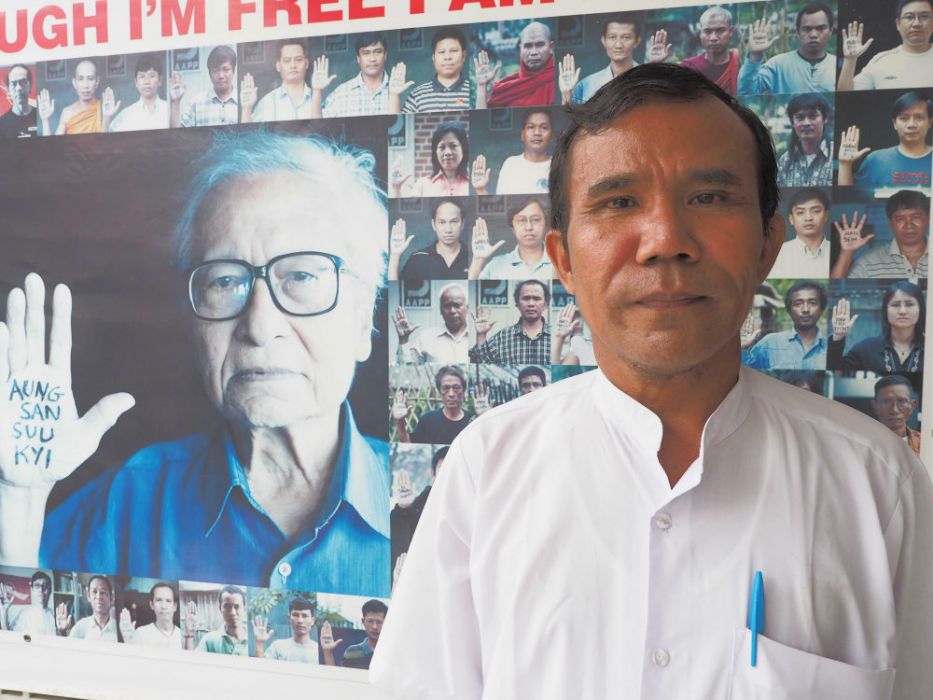By Connor Macdonald
In May 1989, as the military junta continued its brutal crackdown on those linked to the ’88 democratic uprising, Chit San, a former soldier, was arrested by Myanmar’s notorious Special Branch police. For the next five months he was held at a military barracks where he faced interrogations and torture.
His daily routine consisted of waiting in a tiny, dark cell for the inevitable beatings. “Usually it was midnight when the lights would turn on and they’d burst into my cell for an interrogation,” he said.
His daily meal consisted of a foul concoction of watery soup with rice and insects, and a cup of water. Later, he was moved to Yangon’s Insein Prison where he spent six years of a life sentence in overcrowded and squalid conditions.
“I spent the whole time thinking I was never going to leave that place, but mainly I worried for my wife,” he recalled recently.
When Chit San was finally released through an amnesty in 1996 his struggle, however, was not over. Like many thousands of former political prisoners in Myanmar, he suffers from symptoms of depression, anxiety and post traumatic stress disorder (PTSD), which he developed as a result of the psychological and physical trauma he experienced at the hands of the former regime.
Another legacy of the military government, the country’s wrecked healthcare system, means that many of those suffering from psychological problems, whether from torture or other causes, cannot receive much-needed psychological treatment from government healthcare facilities.
Cultural stigma and a lack of public understanding in Myanmar about common disorders, such as depression and anxiety, further worsens their plight. Many people choose to suffer in silence rather than face being labelled ‘ayoo’, or crazy.
A LEGACY OF TRAUMA
In the years after he was released, Chit San found it difficult to reintegrate into normal civilian life. “I had no job so it became a daily struggle just to find enough money to provide food for my family,” he said.
No longer wanting to associate with his political past, he cut all ties with his former friends. As the stress of life outside the prison walls built up, he found himself becoming aggressive and losing his temper over the smallest things; sleepless nights became normal, he said.
These symptoms are common among people who have suffered intense psychological and physical trauma. Lifelong symptoms often also affect sufferers’ relationships, employment and their behaviour. Little is known about how much is spent on mental health in Myanmar, according government health professionals, who could only refer to a 10-year-old World Health Organisation report that says that 0.3 percent of the total health care budget is reserved for mental health care.
With government care almost non-existent, non-profit organisations and overseas supporters have stepped in.
Programs like the Mental Health Assistance Program (MHAP), of the Thailand-based Assistance Association for Political Prisoner’s (AAPP), provide such support. Funded by Johns Hopkins University in the United States, MHAP uses a psychotherapy treatment method called Common Elements Treatment Approach, which is suited for low-resource settings like Myanmar.
Saw Thet Tun, chief clinical supervisor at AAPP and a former political prisoner, said since it began in 2013, MHAP has treated 967 clients of which 521 are former political prisoners, with the programme extending to non-political prisoners in 2015. Currently, the programme has 16 counselors in Yangon with each seeing five to six clients for at least three months of treatment.
This is not enough to meet demand, said Saw Thet Tun. “The people in this country suffered a lot under the military, five teams of counselors just isn’t enough. We can’t help all of those that need it so we train the community in basic understanding of our methods so they can provide support also.”
“Our country needs counseling but the government ignores it because they don’t understand how important it is,” he said, adding that the government has never offered support or interest to work with AAPP on its programme, partly because those in the former government included those responsible for past repression.
OVERCROWDED MENTAL HEALTH HOSPITALS
The few institutions that do provide mental healthcare are severely overstretched, a situation that is painfully clear at Yangon Mental Health Hospital, one of Myanmar’s largest mental healthcare facilities.
Cracked paint comes off the walls of the hospital and its wards are counselor, suggested he try AAPP’s counseling program he considered getting help for his symptoms.
After explaining the programme to his wife and son, who were unaware of such counseling, they agreed to attend sessions included in his treatment. He has now completed a six-month course of counseling and says he has made significant progress in dealing with the effects of his trauma.
“This type of programme is very unusual for this country, but the counseling lets me cope in daily life and helps my family cope as well,” Chit San said, adding that he hoped Myanmar’s mental health services could be expanded to help former prisoners like him.
(Additional reporting by Phyo Thiha Cho; editing by Paul Vrieze)
This article was originally published by Myanmar Now.




